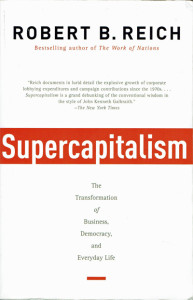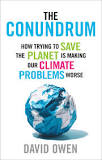Supercapitalism
The transformation of Business, Democracy and Everyday Life
Robert B. Reich is a professor at the Berkeley University in California. He also worked for the American government under President Bill Clinton as secretary of labour.
Here is a quote from the New York Times on their review of “Supercapitalism”: “Reich documents in lurid detail the explosive growth of corporate lobbying expenditures and campaign contributions since the 1970s. . . . Supercapitalism is a grand debunking of the conventional wisdom in the style of John Kenneth Galbraith”.
Ferocious competition on an international scale
During the first few decades that followed the Second World War, before the globalization of the economy, the author shows that in United States, profits derived from mass production were based on rules that insured stability. There was a better redistribution of a company’s profits between workers, shareholders and managers. The CEO even had the possibility to take decisions that would benefit to both the society and his company. The middle class was in better shape.
At the same time as capitalism progressively gained terrain around the planet, increasing inequalities of incomes and wealth followed.
The rise of supercapitalism, around the 70s, is due to the globalization of the economy and, consequently, to an increase of the international competition. Consumers and investors have been benefiting a lot from supercapitalism, but the citizen who feels a social responsibility and looks for the common good gradually lost ground.
The “consumer/investor” versus the “citizen”
The author writes that each person is of two minds: a “consumer and investor” but also a “citizen”. The consumer wants to acquire quality goods at low price and the investor wishes that the money invested towards his retirement provides a great rate of return. If the consumer finds a better price somewhere else, and if the investor considers that the return on investment (ROI) is not adequate, both will look towards the competition.
Meanwhile, the “citizen” in us wishes only good things for the society and the planet: companies must respect the environment; workers must have decent working conditions, etc. The paradox is that while we want the best, we encourage the worst.
Wishing the best while encouraging the worst
The fact that a superstore does not offer good working conditions to his employees irritates the “citizen” in us. However, the superstore’s lower operating costs allow us to save money. If prices go up, we will buy somewhere else.
As investors, we possess, through our mutual funds, numerous financially performing companies. In many countries around the world, profits redistributed to shareholders are the result of minimal working conditions given to employees and abuse on the environment. The investor regularly compares the rate of return of several mutual funds and other investments and he will not hesitate to sell his shares if profits are insufficient.
Increased pressure on the company’s CEO
Globalization and increased competition are forcing managers to think only in terms of return on investment. The CEO is accountable to his dissatisfied shareholders and mutual fund managers who both can sell their shares of an underperforming company.
Consequently, the role of a CEO is not to spend for reasons that would please the “citizen”, but instead to maximize profits using all the legal means at his disposal. This way, he satisfies the consumer and investor. He knows that all his competitors do the same.
As citizens, our role is to forbid companies to establish the rules of the game. Those rules must be set by the government in order to preserve democracy and encourage social responsibility.
Companies are not against new rules that would apply globally to all competitors. What they want to avoid is that a specific company benefits more than another one in the new deal.
Winning or preserving a competitive advantage because of lobbyists
Considering the strong international competition between companies, it is easy to understand that massive amounts of money and other efforts deployed to gain a competitive advantage are in constant growth.
After having worked in Washington, the experienced politician is hired by big corporations as a lobbyist (3% in 1970, 30% in 2005). While the politician’s attention is focused on consumers and investors, the citizen’s voice wishing a greater social equality is not heard.
Supercapitalism thus modifies the way the democratic system operates.
Mutual benefits between politicians and lobbyists
Politicians use that competition to demand important amounts of money to finance their political campaign. In exchange, they support and help push the agenda of a specific company: “That’s how politicians keep their hold on power, and lobbyists keep their hold on money”.
Democracy is perverted by the actions of lobbyists and the attraction that money and other advantages has on politician’s decisions. The government is not managed from the inside but by external powerful economic interests.
Better regulations can improve democracy
The author writes that companies cannot take personal initiatives to correct the situation since it will undermine their position towards other competitors in a global market. “Supercapitalism does not permit acts of corporate virtue that erode the bottom line. No company can “voluntarily” take on extra cost that its competitors don’t also take on, which is why, under supercapitalism, regulations are the only means of getting companies to do things that hurt their bottom lines”. Regulations can only be imposed by political actions.
Learn to recognize the actions used to distract the population
It is necessary for citizens and Medias to recognize the half-truths and distortions that “confound efforts to prevent supercapitalism from overrunning democracy”. The author names a few:
The public blame that changes nothing: beware of politicians who publicly blame corporations for actions that respect the law but that the public despise. The corporation works for the consumer and investor, not for the citizen. A public blame is easy and makes the politician look good. The latter must instead work at improving the law and corporations will then be forced to respect the new parameters.
The corporation that pretends to act on behalf of the public interest: do not believe a corporation that says it works for the public good. It is not its role. It is possible that, in order to improve its image or to satisfy the consumer (and ultimately its shareholders), it does something that looks like it is good for the public. But, basically, there is no acknowledgment of the public good, only a desire to preserve or improve its competitive position.
Lobbyists who pretend to look for the public good: lobbyists and experts who pretend that their initiatives are in the public interest only detract attention from their real objectives that are to protect or advantage a specific corporation.
The private sector and the “voluntary” cooperation: beware of politicians who claim that the public can count on the voluntary cooperation of the private sector in order to protect the public good. It is not the private sector’s role and it will not spend any money unless all of its competitors do the same. Those are only words aimed at buying time and confuse the public. If the public good is so important, then a law must be voted.
Public relation campaigns aimed at one specific corporation: beware of public relation campaigns and pressure groups working to force a specific company to be more socially virtuous. Try to discover the real goals behind those efforts. If all this seems reasonable to you, then ask yourself if a new law or new regulations forcing all the competing corporations to modify their behaviour would better serve the public.
Conclusion
A final quote summarizes very well the author’s thoughts: “In general, corporate responsibilities to the public are better addressed in the democratic process than inside corporate boardrooms. Reformers should focus on laws or regulations they seek to change, and mobilize the public around changing them”.
Title: Supercapitalism
Author: Robert B. Reich
Edition : Vintage Books
ISBN : 978-0-307-27999-2
©2007

